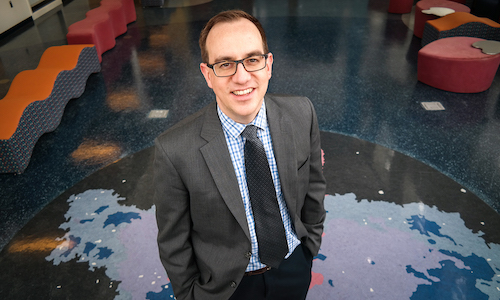
Scott Riggs knows first hand how deep a study abroad experience can be. After all, it took him a good 15 years of reflection to unpack all the ways in which his semester-long undergraduate experience in Ghana transformed him. But having that opportunity, he said, makes him one of the lucky ones.
“The University of Michigan-Ann Arbor campus is a massive center of study abroad, but still, only about a quarter of students will have that experience,” Riggs said. “Last year, here on our campus, we had about a hundred students study abroad—out of almost 10,000 students.”
Riggs, who’s now serving in the provost’s office as the university’s first director of global engagement, said he’s committed to growing that number. But his bigger vision is to capture the essence of that cultural exchange experience—and then package it in creative ways that provide opportunities for students closer to home.
For Riggs, that will mean tapping the potential of what he calls “difficult differences”—which include the typical dividing lines in American society, like race, religion or political affiliation.
“Those things can certainly divide us,” Riggs said. “But teaching students how to have empathy, how to be curious, how to understand a different side—I think that only comes with interacting with someone very different from you, experiencing the dissonance and then learning from it.”
But that, Riggs said, doesn't require crossing national borders, especially in an area with as much diversity as metro Detroit.
He points to the university's current Semester in Detroit program as a case in point. The program—which is offered to UM-Dearborn students through UM-Ann Arbor’s College of Literature, Science, and the Arts—allows students to pursue their studies or internships while living and investing in a host Detroit neighborhood.
And Riggs said even smaller bites at the apple—like events where students can simply have a conversation with someone of a different background—can lay the ground for busting out of our silos.
“There’s a contact theory, which says you bring differences together and good things will happen,” he said. “But the reality is sometimes we need to have a little help to have it come together in a meaningful way.”
Riggs envisions a full menu of similarly spirited activities, from quick hits like workshops up through a top-shelf opportunity like study abroad. And as with most things at the university, the goal is to help students develop skills and knowledge that will help them in their lives and careers down the road. In fact, Riggs said so-called “soft skills”—like creativity, listening and empathy—are increasingly coveted by employers. And like any skill, they have to be actively learned, developed and continuously exercised. Global education, Riggs said, provides a natural context to sharpen them.
Riggs also believes UM-Dearborn is the perfect setting for innovating in this new, more expansive global education space.
“A lot of this builds on things we’re doing well already, because our campus has a long history of appreciating our diversity,” he said. “To me, that deserves some thought as to how we can make it an even stronger experience for students and the larger metropolitan community. There’s no reason we can’t be leading the charge.”





